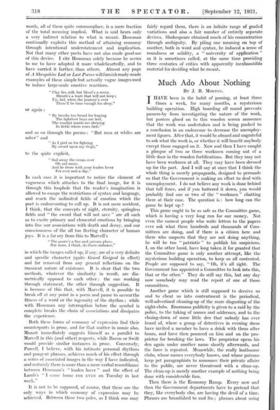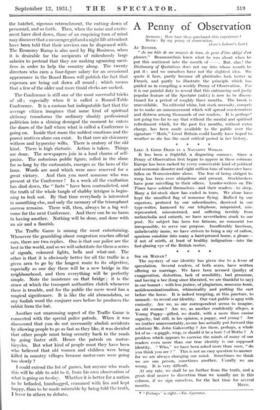Much Ado About Nothing
By J. B. MORTON.
IHAVE been in the habit of passing, at least three times a week, for many months, a mysterious building operation. High boarding all round prevents passers-by from investigating the nature of the work, but posters glued on to this wooden screen announce that the work was undertaken and is being pushed to a conclusion in an endeavour to decrease the unemploy- ment figures. After that, it would be absurd and ungrateful to ask what the work is, or whether it will benefit anybody except those engaged on it. Now and then I have caught a glimpse of two or three workmen coming out of a little door in the wooden fortifications. But they may not have been workmen at all. They may have been dressed up for the part. And I will say at once that I think the whole thing is merely pfopaganda, designed to persuade us that the Government is making an effort to deal with unemployment. I do not believe any work is done behind that tall fence, and if you battered it down, you would probably find one or two of the " workmen " chatting there at their ease. The question is : how long can the game be kept up ?
This game ought to be as safe as the Committee game, which is having a very long run for our money. Not even the earnest people who write letters to the papers ever ask what these hundreds and thousands of Com- mittees are doing, and if there is a citizen here and there who suspects that they are not doing anything, he will be too " patriotic " to publish his suspicions. I, on the other hand, have long taken it for granted that the Committee game is only another attempt, like the mysterious building operation, to keep us all contented. People are supposed to say, " Oh, it's all right. The Government has appointed a Committee to look into this, that or the other." They do still say this, but any day now somebody may read the report of one of those committees.
Another game which is still supposed to deceive us and to cheat us into contentment is the periodical, well-advertised cleaning-up of the more disgusting of the night-clubs. Enormous publicity is given to a raid by the police, to the taking of names and addresses, and to the closing-down of some little den that nobody has .ever heard of, where a group of detectives in evening dress have invited a member to have a drink with them after hours, and have then pounced on him and on the pro- prietor for breaking the laws. The proprietor opens his den again under another name shortly afterwards, and the farce is repeated. Meanwhile, the really loathsome clubs, whose names everybody knows, and whose patrons keep pet paragraphists to announce their private affairs to the public, are never threatened with a clean-up. The clean-up is merely another example of nothing being done with considerable fuss.
Then there is the -Economy Ramp. Every now and then the Government departments have to pretend that they, like everybody else, are having the devil of a time. Phrases are brandished to and fro ; phrases about using the hatchet, rigorous retrenchment, the cutting down of personnel, and so forth. Then, when the noise and excite- ment have died down, those of an enquiring turn of mind may discover that a messenger girl and a night lift-attendant have been told that their services can be dispensed with. The Economy Ramp is also used by Big Business, when it is desirable for the recipients of ridiculously large salaries to pretend that they are making agonizing sacri- fices in order to help the country along. The twenty directors who earn a four-figure salary for an occasional appearance in the Board Room will publish the fact that expenses are being cut down all round ; which means that a few of the older and more timid clerks are sacked.
The Conference is still one of the most successful tricks of all ; especially when it is called a Round-Table Conference. It is a curious but indisputable fact that the average citizen imagines that some kind of spiritual alchemy transforms the ordinary shoddy professional politician into a shining demigod the moment he enters the doors of the hall where what is called a Conference is going on. Inside that room the noblest emotions and the purest motives alone can exist. In that rare air chicanery withers and hypocrisy wilts. There is oratory of the old kind. There is high rhetoric. Action is taken. Things are done. The newspapers join in a loud chorus of self- praise. The notorious public figure, rolled in the slime for so long by the cartoonists, emerges as the hero of the hour. Words are used which were once reserved for a great victory. And then you meet someone who was present at the Conference ! In a week all the exultation has died down, the " facts " have been contradicted, and the truth of the whole tangle of shabby intrigue is begin- ning to leak out. By that time everybody is interested in something else, and only the memory of the triumphant success remains. There will, then, always be a big wel- come for the next Conference. And there can be no harm in having another. Nothing will be done, and done with an air and a flourish.
The Traffic Game is among the most entertaining. Whenever the grumbling about congestion reaches official ears, there are two replies. One is that our police are the best in the world, and so we will substitute for them a series of signals, coloured lights, bells and what-not. Tile other is that it is obviously better for all the traffic in a given area to go by the longest route to its objective, especially as one day there will be a new bridge in the neighbourhood,. and then everything will be perfectly simple. Note the insistence on that bridge ; it is the straw at which the transport authorities clutch whenever there is trouble, and for the public the mere word has a magical significance. It is like the old abracadabra, or any foolish word the conjurer uses before he produces the rabbit from the hat. . .
Another not unamusing aspect of the Traffic Game is connected with the special police patrols. When it was discovered that you do not necessarily abolish accidents by allowing people to go as fast as they like, it Was decided that other people must bring security back to the roads by going faster still. Hence the patrols on motor- bicycles. But what kind of people must they have been who believed that old women and children were being killed in country villages because motor-cars were going too slowly ?
I could extend the list of games, but anyone who reads this will be able to add to it, from his own observation of what is going on to-day. Whether it is better for a nation to be befooled, humbugged, crammed with lies and kept happy, than to be made miserable by being told the truth, I leave to others to debate.































 Previous page
Previous page